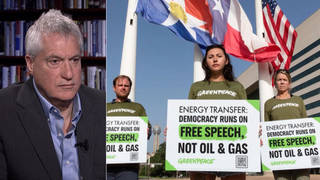
Topics
By Amy Goodman with Denis Moynihan
Western Pennsylvania is considered the birthplace of commercial oil drilling. On Aug. 27, 1859, Edwin Drake struck oil in Titusville, Pa., and changed the course of history. Now, people there are busy trying to stop wells, and the increasingly pervasive drilling practice known as fracking. Fracking is the popular term for hydraulic fracturing, the technique used to extract natural gas from deep beneath the earth’s surface. Fracking is promoted by the gas industry as the key to escaping from dependence on foreign oil. But evidence is mounting that fracking pollutes groundwater with a witches’ brew of toxic chemicals, creating imminent threats to public health and safety. It has even caused earthquakes in Ohio. As people mark the first anniversary of Occupy Wall Street, popular resistance to the immense power of the energy industry is on the rise.
Underlying the problem of fracking is, literally, the Marcellus Shale (which is formally called, coincidentally, the Marcellus Member of the Romney Formation). This massive, underground geologic formation stretches from upstate New York across Pennsylvania and eastern Ohio, through West Virginia, Tennessee and parts of Virginia. Unlike the easily extracted crude oil of Saudi Arabia, the natural gas in the Marcellus Shale is captured in tiny pockets, and is hard to get at. In order to extract it with what the industry considers efficiency, holes are drilled thousands of feet deep, which then turn a corner and continue thousands more feet, horizontally. The detonation of explosive charges, coupled with the infusion of high-pressure fluids, fractures the shale, allowing the gas to bubble up to the surface.
The components of the fluids used for fracking are considered protected trade secrets, although they are known to contain toxins. Where the fracking fluids go is a key question. “Only 20 percent of that water returns, and that water returns with radioactive material—barium, strontium,” former Pittsburgh Councilman Doug Shields told me. “It’s inherently dangerous. There’s no environmental-impact studies on the part of the state. The state—the institutions of our government—failed miserably to do any kind of due diligence … no environmental-impact studies, no health-risk studies. And now I’ve got sick people all over.”
Shields put forth a city ordinance banning fracking, which passed. The oil and gas industry fought back: “They went so far as to pass an act, Act 13, that pre-empted all zoning ordinances and authority for just one industry: the oil and gas industry,” said Shields, “And Pennsylvania has a use by right, under the law enacted in February, to drill anywhere—[including] residential areas.” Pennsylvania townships sued, calling unconstitutional the obliteration of their local rights to maintain public health. They won, but are scheduled to defend their rights in Pennsylvania’s Supreme Court Oct. 17.
The problem gets worse in Ohio. Unlike Pennsylvania and New York, Ohio has not banned wastewater injection wells. These wells are used to dispose of waste liquids, by pumping the liquids far underground. Ohio has become the dumping ground for fracking wastewater from Pennsylvania and New York. Like fracking liquids, much of the material is known to contain toxins, but little more is known about what is being pumped underground. Nor is there any certainty about where the liquid ends up.
Last June, Athens, Ohio, resident Madeline ffitch decided to take action. She sat in the road, blocking access to a local injection well, with her arms secured inside two concrete-filled barrels. In what onlookers described as a complete law-enforcement overreaction, several agencies arrived to extract ffitch. She was charged with inducing panic, a fifth-degree felony. Rather than inducing panic, however, ffitch’s act of nonviolent civil disobedience has inspired local support, bringing national attention to the issue.
Fracking entered the national debate when the award-winning documentary “Gasland,” made by filmmaker Josh Fox, showed how people living near fracking operations could easily set their kitchen tap water on fire. Fox recently released an “emergency short film” to focus attention on grass-roots efforts to ban fracking in New York state. Like every good journalist, and appropriately, in this post-Citizens United era, Fox follows the money. He points out that former Pennsylvania Gov. Tom Ridge is now a lobbyist for the gas industry, and has received, for his efforts, more than $900,000, while current Pennsylvania Gov. Tom Corbett has received more than $1.6 million in campaign contributions from the industry.
Fracking as a political issue, like that tap water, is catching fire. Traveling the country on a 100-city tour covering the 2012 election, I continually meet people who are deeply concerned about what is percolating beneath them. Public outrage is shifting into coordinated action. Their message: “Keep the frack out of my water.”
Amy Goodman is the host of “Democracy Now!,” a daily international TV/radio news hour airing on more than 1,100 stations in the United States and around the world. She is the author of “Breaking the Sound Barrier,” recently released in paperback and now a New York Times best-seller.
© 2012 Amy Goodman











Media Options